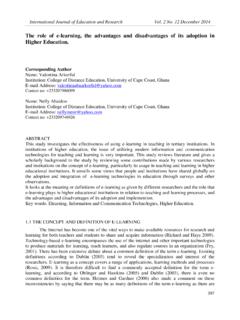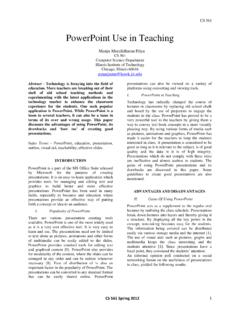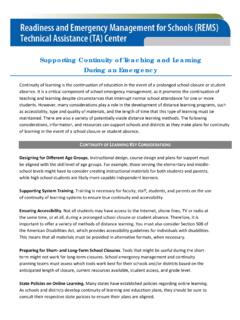Transcription of SOCIAL MEDIA IMPACT ON LANGUAGE LEARNING FOR …
1 teaching English with technology , 19(1), 56-71, 56 SOCIAL MEDIA IMPACT ON LANGUAGE LEARNING FOR SPECIFIC PURPOSES: A STUDY IN ENGLISH FOR BUSINESS ADMINISTRATION by Hadoussa Slim and Menif Hafedh University of Tabuk, Tabuk, Saudi Arabia @ , @ , mnifhafedh @ Abstract Nowadays, SOCIAL MEDIA are dominating the life of people. Facebook has become noticeably widespread among the youth, and students in particular. Research has indicated that Facebook could be an effective platform for LANGUAGE LEARNING . This study, therefore, comes to explore the effects of Facebook-assisted teaching on LEARNING English for specific purposes by students at the University of Tabuk, Saudi Arabia.
2 A sample of 64 students from the Faculty of Business Administration, taking a Business Letters course in English, were divided into a Facebook-tutored group and a traditional classroom tutored group and were given the same vocabulary content. The two groups were given pre- and post-tests to measure their vocabulary LEARNING , and were subjected to an interview to gauge their attitudes towards the instructional methods which were put to use. However, no significant difference between the two groups was found in terms of achievement in spite of the positive response and the high satisfaction level the Facebook-tutored students showed towards the use of such a platform.
3 Keywords: SOCIAL MEDIA ; Facebook; English LANGUAGE LEARNING 1. Introduction In the recent years, information technologies and SOCIAL MEDIA , in particular, have affected the life of Saudis, in general, and the educational community in particular. It is due to their different forms which help people communicate in various ways: such as blogs, SOCIAL networks (Facebook), microblogs (Twitter), wikis (Wikipedia), video podcasts, and photo sharing (Instagram and Snapchat). Such applications as Facebook, Twitter, YouTube, and WhatsApp have massively boosted SOCIAL interaction and information sharing within student and teacher communities alike.
4 The reason behind this expansion might well be the human craving for discovery, boundless connection and exchange of information and opinion with other users with the same interests. SOCIAL MEDIA applications allow users to cross the boundaries of their countries, connect and express themselves on a global scale (Thorne, 2010). teaching English with technology , 19(1), 56-71, 57 It follows that the possibilities offered by SOCIAL MEDIA nowadays could also be linguistically rewarding for users, be they students or educators, as these MEDIA interactions are bound to take place either within the same linguistic communities or across different ones.
5 Facebook, as one of those MEDIA , has been globally ranked as one of the most used SOCIAL platforms ever created with billion users ( ). It has come to yield unprecedented opportunities for foreign LANGUAGE teachers and learners alike, as it offers them the possibility to exchange limitless numbers of text messages, images, and videos. Such options can give those users and LANGUAGE learners, in particular, the opportunity to practice with new texts and learn new vocabulary through interaction, especially if it extends over time.
6 As regards educators, they can benefit from Facebook by using it as a platform to post different kinds of materials (texts, images, graphs, and video), to be worked upon, edited, added to and shared among their students to attain intended objectives. Hence, the teaching experience can be more accessible and centered around students, as more room is given to learners to collaborate and an atmosphere of conviviality and creativity is enhanced among them (Selwyn, 2012). The research interest in Facebook is growing due to its increasing popularity and the possibilities it gives teachers and students to share information and learn from each other.
7 Facebook remains the most popular SOCIAL network, accounting for 71% of Internet users (Balakrishnan & Lay, 2016). It has about billion users around the world and 14 million users in Saudi Arabia, 7 million of whom are aged between 18 and 29 ( ). This considerable figure can be ascribed to the possibilities Facebook provides for its users to share a large amount of data and communicate with friends. Besides, Facebook allows its users to send and receive prompt messages and mail and is an efficient means of information sharing, socialization, and adaptation to university life among students and instructors (Roblyer et al.)
8 , 2010; Yu et al., 2010; Bowers-Campbell, 2008). In the same vein, Blattner and Fiori (2009) found that Facebook helped students improve their socio-pragmatic competence. Lee (2006) argues that Facebook use enhanced students oral proficiency, vocabulary acquisition, and syntactic complexity in the Korean LANGUAGE . Derakshan and Hasanabbasi (2015) claims that Facebook promoted students communication and LANGUAGE skills. Yet, studies on the IMPACT of Facebook on Arab students English LANGUAGE acquisition, especially in KSA, are still rare and the existing ones remain too general as they do not focus on specific LANGUAGE areas.
9 This should give us the legitimacy to embark on a study that would focus on the effects of Facebook use on ESP students achievement in English as a second LANGUAGE , especially in the sphere of vocabulary LEARNING . teaching English with technology , 19(1), 56-71, 58 2. Literature review SOCIAL MEDIA import and usage at university level Various studies have dealt with SOCIAL MEDIA availability and the new horizons they have created, especially for the youths (Lin et al., 2016). Out of these MEDIA , YouTube and Flickr are used to share visual materials, Facebook and Linkedin provide SOCIAL networking, Wikipedia specializes in the development of collaborative knowledge and Twitter in microblogging (Balakrishnan & Lay, 2016).
10 For Lin et al. (2016), SOCIAL MEDIA , such as Facebook, Twitter, and YouTube, not only give users the possibility to generate information but also to share it with other users around the globe. In view of their proliferation and the possibilities they provide, researchers have called for the use of SOCIAL MEDIA in the field of education (Everson et al., 2013; Greenhow & Robelia, 2009; Roblyer et al., 2010). Balakrishnan and Lay (2016) report that Facebook and YouTube have been used within and outside classrooms for teaching purposes, such as to upload educational videos or LEARNING materials for students.
















